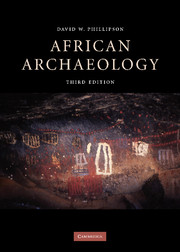Book contents
- Frontmatter
- Contents
- List of illustrations
- Sources of illustrations
- Preface
- 1 Introduction
- 2 The emergence of humankind in Africa
- 3 The consolidation of basic human culture
- 4 Regional diversification and specialisation
- 5 The beginnings of permanent settlement
- 6 Early farmers
- 7 Iron-using peoples before AD 1000
- 8 The second millennium ad in sub-Saharan Africa
- Bibliographic guide
- Bibliographic references
- Index
8 - The second millennium ad in sub-Saharan Africa
Published online by Cambridge University Press: 05 June 2012
- Frontmatter
- Contents
- List of illustrations
- Sources of illustrations
- Preface
- 1 Introduction
- 2 The emergence of humankind in Africa
- 3 The consolidation of basic human culture
- 4 Regional diversification and specialisation
- 5 The beginnings of permanent settlement
- 6 Early farmers
- 7 Iron-using peoples before AD 1000
- 8 The second millennium ad in sub-Saharan Africa
- Bibliographic guide
- Bibliographic references
- Index
Summary
The last 1000 years
In many parts of Africa the last 1000 years comprise a period for which archaeology, although still of considerable importance, is by no means our only source of information. Linguistic reconstructions which, when taken together with the results of archaeology, have been valuable for illuminating earlier times, now become less speculative. For the more recent periods the oral historical traditions of many African societies preserve a great deal of valuable information, even though their interpretation is exposed to many pitfalls. In some areas of the continent, written records are also available. For much of northern Africa, indeed, the last 1000 years fall fully within the period of written history, and for that reason this chapter is concerned only with the regions lying to the south of the Sahara. Here, some areas, such as those of the sudanic kingdoms and parts of the East African coast, were in more-or-less regular contact with people from literate communities in whose records much useful historical detail has been preserved. These writings may be used in conjunction with information from other sources in the building up of a composite picture of the period's events and developments. Elsewhere, we have no significant written records pre-dating contact with the European traders and colonisers who gradually established control over most of Africa between the fifteenth and the nineteenth centuries.
- Type
- Chapter
- Information
- African Archaeology , pp. 274 - 309Publisher: Cambridge University PressPrint publication year: 2005



